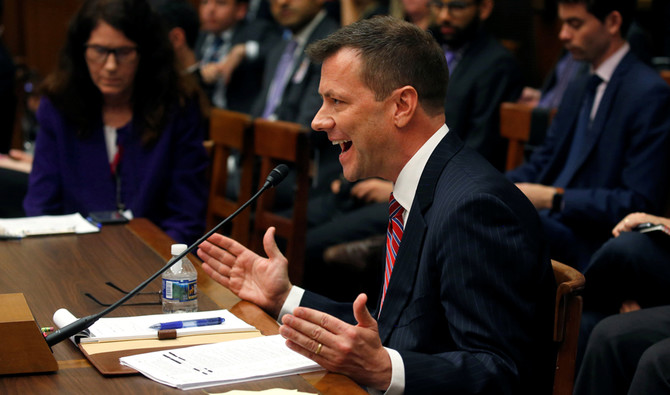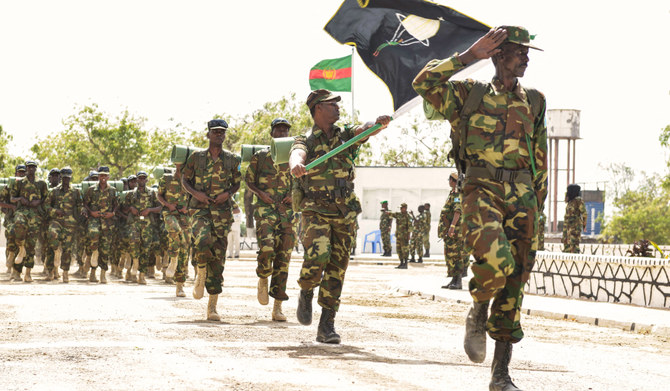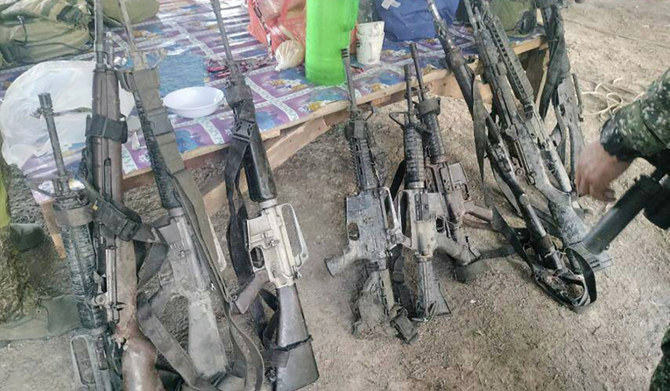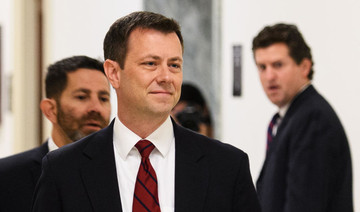WASHINGTON: An embattled FBI agent whose anti-Trump text messages exposed the Justice Department to claims of institutional bias vigorously defended himself Thursday at an extraordinary congressional hearing that devolved into shouting matches, finger-pointing and veiled references to personal transgressions.
Peter Strzok testified publicly for the first time since being removed from special counsel Robert Mueller’s team following the discovery of texts last year that were traded with an FBI lawyer in the run-up to the 2016 presidential election.
In a chaotic hearing that spanned 10 hours, he insisted he never allowed personal opinions to affect his work, though he did acknowledge being dismayed by Donald Trump’s behavior during the campaign. He also said he had never contemplated leaking damaging information he knew about the Trump campaign and called the hearing “just another victory notch in Putin’s belt.”
“At no time, in any of those texts, did those personal beliefs ever enter into the realm of any action I took,” Strzok told lawmakers.
In breaking his silence, Strzok came face-to-face with Republicans who argued that the texts had tainted two hugely consequential FBI probes he had helped steer: inquiries into Hillary Clinton’s email use and possible coordination between the Trump campaign and Russia.
“Agent Strzok had Hillary Clinton winning the White House before he finished investigating her,” said Rep. Trey Gowdy, Republican chairman of the House Oversight and Government Reform Committee. “Agent Strzok had Donald Trump impeached before he even started investigating him. That is bias.”
Republican Rep. Darrell Issa made Strzok read some of his texts aloud, including some with profane language. House Judiciary Committee Chairman Bob Goodlatte asked colleagues to imagine being investigated by someone who “hated you” and “disparaged you in all manner of ways.”
“Would anyone sitting here today believe that this was an acceptable state of affairs, particularly at an agency whose motto is ‘Fidelity, Bravery and Integrity’? I think not,” Goodlatte said.
Strzok repeatedly insisted the texts, including ones in which he called Trump a “disaster” and said “We’ll stop” a Trump candidacy, did not reflect political bias and had not infected his work.
He said the Trump investigation originated not out of personal animus but rather from concern that Russia was meddling in the election, including what he said were allegations of “extraordinary significance” of a Russian offer of assistance to a Trump campaign member.
He made clear his exasperation at being the focus of a hearing when Russian election interference had successfully sowed discord in America.
“I have the utmost respect for Congress’ oversight role, but I truly believe that today’s hearing is just another victory notch in Putin’s belt and another milestone in our enemies’ campaign to tear America apart,” Strzok said.
The hearing brought to the surface a little-discussed reality of public service: Law enforcement agents and other government workers are permitted to espouse political views but are expected to keep them separate from their work. Strzok said he was not alone in holding political opinions, noting that colleagues in 2016 supported both Clinton and Trump but did not reflect those views on the job.
“What I am telling you is I and the other men and women of the FBI, every day take our personal beliefs, and set those aside in vigorous pursuit of the truth — wherever it lies, whatever it is.”
To which Rep. Ted Poe, R-Texas, responded, “And I don’t believe you.”
Strzok said under aggressive questioning that a much-discussed August 2016 text in which he vowed “we’ll stop” a Trump candidacy followed Trump’s denigration of the family of a dead US service member. He said the late-night, off-the-cuff text reflected his belief that Americans would not stomach such “horrible, disgusting behavior” by the presidential candidate.
But, he added in a raised voice and emphatic tone: “It was in no way — unequivocally — any suggestion that me, the FBI, would take any action whatsoever to improperly impact the electoral process for any candidate. So, I take great offense, and I take great disagreement to your assertion of what that was or wasn’t.”
Plus, he said, both the Clinton and Russia investigations were handled by large teams that “would not tolerate any improper behavior in me anymore than I would tolerate it in them.
“That is who we are as the FBI,” Strzok said in an animated riff that drew Democratic applause. “And the suggestion that I, in some dark chamber somewhere in the FBI, would somehow cast aside all of these procedures, all of these safeguards and somehow be able to do this is astounding to me. It simply couldn’t happen.”
The hearing exposed clear partisan divides in the House judiciary and oversight committees, as Democrats accused Republicans of trying to divert attention from Trump’s ties to Russia by excessively focusing on Strzok.
Democratic Rep. Steve Cohen of Tennessee said he would give Strzok a Purple Heart if he could. Rep. Bonnie Watson Coleman, D-New Jersey, said, “I have never seen my colleagues so out of control, so angry.”
But Republicans eager to undermine Mueller’s investigation berated Strzok, citing the texts as evidence of partisan bias within law enforcement. An inspector general report last month blamed Strzok and FBI lawyer Lisa Page for creating an appearance of impropriety through their texts but found that the outcome of the Clinton investigation wasn’t tainted by bias.
At one point, Rep. Louis Gohmert, a Texas Republican, invoked Strzok’s personal life by alluding to the fact the texts were exchanged while he and Page were in a relationship. Gohmert speculated about whether he looked “so innocent” when he looked into his wife’s eyes and lied about the affair.
The comments sparked immediate objections from Democrats, who called them outrageous, and Strzok was livid. He told Gohmert the fact that he would say that “shows more what you stand for” than anything else. Gohmert tried to shout over him and the committee chairman vainly tried to restore order.
When Strzok declined to answer some questions on the Russia probe, Goodlatte suggested Republicans might recess the hearing and hold him in contempt. Democrats objected and Goodlatte eventually let the hearing proceed.
In his opening statement, Strzok acknowledged that while his text message criticism was “blunt,” it was not directed at one person or party and included jabs not only at Trump but also at Clinton and Sen. Bernie Sanders.
He said he was one of the few people in 2016 who knew the details of Russian election interference and its possible connections with the Trump campaign, and that that information could have derailed Trump’s election chances. But, he said, “the thought of exposing that information never crossed my mind.”
FBI Director Chris Wray says employees who were singled out for criticism by the inspector general have been referred to internal disciplinary officials. Strzok’s lawyer said he was escorted from the FBI building last month as the disciplinary process proceeds.
Page is expected to speak to lawmakers at a private meeting Friday.
FBI agent clashes with GOP at hearing on Russia probe
FBI agent clashes with GOP at hearing on Russia probe

- Peter Strzok testified publicly for the first time since being removed from special counsel Robert Mueller’s team following the discovery of texts last year that were traded with an FBI lawyer in the run-up to the 2016 presidential election.
- Strzok repeatedly insisted the texts, including ones in which he called Trump a “disaster” and said “We’ll stop” a Trump candidacy, did not reflect political bias and had not infected his work.
Somalia detains US-trained commandos over theft of rations

- The US agreed in 2017 to help train and equip the 3,000-strong Danab to act as a quick-reaction strike force against Al-Shabab
MOGADISHU: Somalia’s government said it had suspended and detained several members of an elite, US-trained commando unit for stealing rations donated by the US, adding that it was taking over responsibility for provisioning the force.
The Danab unit has been a key pillar of US-backed efforts to combat the Al-Qaeda-linked militant group Al-Shabab. The US agreed in February to spend more than $100 million to build up to five military bases for Danab.
Somalia’s Defense Ministry said in a statement that it had notified international partners of the theft and would share the outcome of its investigation.
A US official said in a statement to Reuters that Washington takes all corruption accusations seriously.
“We look forward to engaging with the Danab on creating the necessary safeguards and accountability measures to prevent future incidents that could affect future assistance,” the official said, without directly addressing whether any US support had already been suspended.
The US agreed in 2017 to help train and equip the 3,000-strong Danab to act as a quick-reaction strike force against Al-Shabab.
The group has been waging an insurgency against the central government since 2006.
Danab has been heavily involved in a military offensive by the Somali military and allied clan militias since 2022 that initially succeeded in wresting swaths of territory from Al-Shabab in central Somalia.
However, the campaign has lost momentum, with the government-allied forces struggling to hold rural areas and Al-Shabab continuing to stage large-scale attacks, including in the capital Mogadishu.
Washington suspended some defense assistance to Somalia in 2017 after the military could not account for food and fuel.
The US also conducts frequent drone strikes targeting Al-Shabab militants.
Kenya flood death toll since March climbs to 70

- Tanzania Prime Minister Kassim Majaliwa said on Thursday that more than 200,000 people had been affected by the disaster, with 155 fatalities and 236 people injured
NAIROBI: The number of people killed in floods in Kenya due to heavier than usual rainfall since the start of the monsoon in March has risen to 70, a government spokesperson said on Friday.
In recent weeks, Kenya and other countries in East Africa — a region highly vulnerable to climate change — have been pounded by heavier-than-usual rainfall compounded by the El Nino weather pattern.
El Nino is a naturally occurring climate pattern typically associated with increased heat worldwide, leading to drought in some parts of the world and heavy rains elsewhere.
BACKGROUND
Kenyans have been warned to stay on alert, with the forecast for more heavy rains across the country in the coming days as the monsoon batters East Africa.
“The official tally of fellow Kenyans who regrettably have lost their lives due to the flooding situation now stands at 70 lives,” government spokesperson Isaac Mwaura said on X after torrential rains killed more than a dozen people in the capital, Nairobi, this week.
Mwaura said the government would issue a “comprehensive brief” following a meeting with the national emergency response committee after the extreme weather caused chaos across Nairobi this week, blocking roads and engulfing homes in slum districts. Kenyans have been warned to stay on alert, with the forecast for more heavy rains across the country in the coming days as the monsoon batters East Africa.
At least 155 people have died in neighboring Tanzania due to flooding and landslides.
Tanzania Prime Minister Kassim Majaliwa said on Thursday that more than 200,000 people had been affected by the disaster, with 155 fatalities and 236 people injured.
He said homes, property, crops, and infrastructure such as roads, bridges, railways, and schools had been damaged or destroyed.
In Burundi, one of the poorest countries on the planet, around 96,000 people have been displaced by months of relentless rains, the United Nations and the government said this month.
Meanwhile, the UN humanitarian response agency, OCHA, said in an update this week that in Somalia, the seasonal Gu rains from April to June are intensifying, with flash floods reported since April 19.
It said four people had been reportedly killed and more than 800 people affected or displaced nationwide.
Uganda has also suffered heavy storms that have caused riverbanks to burst, with two fatalities confirmed and several hundred villagers displaced.
Late last year, more than 300 people died in torrential rains and floods in Kenya, Somalia, and Ethiopia, just as the region was trying to recover from its worst drought in four decades that left millions of people hungry.
From October 1997 to January 1998, massive flooding caused more than 6,000 deaths in five countries in the region.
Jewish campaign group led by Gideon Falter cancels London march over safety concerns

- The Campaign Against Antisemitism says safety concerns forced it to call off its “Walk Together” march after receiving threats from ‘hostile actors’
- Last weekend, a video appeared to show police prevent ‘openly Jewish’ Falter from walking near a pro-Palestine protest but a longer version of the footage painted a different picture
LONDON: The organizers of a march in protest against antisemitism, planned for Saturday in London, “reluctantly” announced on Friday that they were canceling the demonstration.
The Campaign Against Antisemitism said it was forced by safety concerns to call off its “Walk Together” march, which was scheduled to coincide with the latest in a series of pro-Palestine marches in the British capital. The organization said it had expected thousands of people to take part but threats from “hostile actors” posed a safety risk.
“We have received numerous threats and our monitoring has identified hostile actors who seem to have intended to come to any meeting locations that we announced,” the CAA said.
“The risk to the safety of those who wished to walk openly as Jews in London tomorrow as part of this initiative has therefore become too great.
“We are no less angry about these marches than our Jewish community and its allies. We want to walk.”
The group added that it wants the Metropolitan Police not only to “manage marches” but “police” them.
Last weekend, a video that circulated on social media sparked controversy as it showed a confrontation between the CAA’s chief executive, Gideon Falter, and a Metropolitan Police officer who appeared to be preventing him from crossing the road in the vicinity of a pro-Palestine march in London because he was “openly Jewish” and his presence was “antagonizing.”
Falter, who was threatened with arrest if he did not leave the area, criticized the police for their actions during the incident and claimed there were now “no-go zones for Jews” in London amid a rise in antisemitic sentiment arising from Israel’s war on Gaza following the Oct. 7 attacks by Hamas.
Police chiefs apologized twice for the officer’s choice of words. However, a former senior police officer said on Monday that the initial, short version of the video most people saw online “did not fully represent the situation.”
A longer version showed the officer expressing concern about Falter’s actions because he appeared to be deliberately attempting to provoke the pro-Palestinian demonstrators.
Berlin police clear pro-Palestinian camp from parliament lawn

- Police dismantled tents, forcibly removed protesters and blocked the surrounding area to stop others arriving
- "The idea was to draw attention to that and ... to the German complicity and active enabling of the Israeli genocide in Gaza," the camp organizer, Jara Nassar, said
BERLIN: Berlin police on Friday began clearing a pro-Palestinian camp set up in front of the German parliament by activists demanding the government stop arms exports to Israel and end what they say is the criminalization of the Palestinian solidarity movement.
Police dismantled tents, forcibly removed protesters and blocked the surrounding area to stop others arriving.
The action followed clashes between demonstrators and police on US campuses and a blockade at Paris’s Sciences Po university, part of international protests to decry Israel’s military campaign in Gaza and Western support for Israel.
The Berlin camp ‘Besetzung Gegen Besatzung’ — ‘Occupy Against Occupation’ — began on April 8, coinciding with the start of International Court of Justice hearings in Nicaragua’s case against Germany for providing military aid to Israel.
“The idea was to draw attention to that and ... to the German complicity and active enabling of the Israeli genocide in Gaza,” the camp organizer, Jara Nassar, told Reuters.
Israel strongly denies accusations that its offensive in Gaza, which aims to destroy the Palestinian militant group Hamas, constitutes a genocide.
Nassar and a dozen protesters sat on the ground, chanting pro-Palestinian slogans and songs as police with loudspeakers called on them to leave.
“We look at what is happening in the US ... with admiration. There is no reason to believe we should stop now,” said Udi Raz, a PhD student at Berlin’s Free University and a member of the Jewish Voice association.
Raz, who wore a Jewish kippah with the Palestinian flag colors and held his phone in a live social media broadcast of the clearance, said Jewish activists had joined the camp and held a candle-lit Passover dinner there this week.
Police said the prohibition order for the camp, which had been granted authorization at the start of the protest, was due to repeated violations committed by some protesters, including the use of unconstitutional symbols and forbidden slogans.
“Protection of gatherings cannot be guaranteed at this point because public safety and order are significantly at risk,” police spokesperson Anja Dierschkesaid said, adding tents had to be moved daily under local regulations to maintain the lawn.
“For the German government, grass matters more than the lives of more than 40,000 innocent people in Gaza murdered by the Israeli military,” Raz said.
Philippine police kill an Abu Sayyaf militant implicated in 15 beheadings and other atrocities

- A confidential police report said that Abdulsaid had been implicated in at least 15 beheadings in Basilan, including of 10 Philippine marines in Al-Barka town in 2007 and two of six kidnapped Vietnamese sailors near Sumisip town in 2016
MANILA: Philippine forces killed an Abu Sayyaf militant, who had been implicated in past beheadings, including of 10 Filipino marines and two kidnapped Vietnamese, in a clash in the south, police officials said Friday.
Philippine police, backed by military intelligence agents, killed Nawapi Abdulsaid in a brief gunbattle Wednesday night in the remote coastal town of Hadji Mohammad Ajul on Basilan island after weeks of surveillance, security officials said.
Abu Sayyaf is a small but violent armed Muslim group, which has been blacklisted by the US and the Philippines as a terrorist organization for ransom kidnappings, beheadings, bombings and other bloody attacks. It has been considerably weakened by battle setbacks, surrenders and infighting, but remains a security threat particularly in the southern Philippines, home to minority Muslims in the predominantly Roman Catholic nation.
Abdulsaid, who used the nom de guerre Khatan, was one of several Abu Sayyaf militants who aligned themselves with the Daesh group.
A confidential police report said that Abdulsaid had been implicated in at least 15 beheadings in Basilan, including of 10 Philippine marines in Al-Barka town in 2007 and two of six kidnapped Vietnamese sailors near Sumisip town in 2016. The Vietnamese were seized from a passing cargo ship.
He was also involved in attacks against government forces in 2022 and a bombing in November that killed two pro-government militiamen and wounded two others in Basilan, the report said.
Abdulsaid was placed under surveillance in February, but police forces couldn’t immediately move to make a arrest because of the “hostile nature” of the area where he was eventually gunned down, according to the report.
On Monday, Philippine troops killed the leader of another Muslim rebel group and 11 of his men blamed for past bombings and extortion in a separate clash in a marshy hinterland in Datu Saudi Ampatuan town in southern Maguindanao del Sur province, the military said.
Seven soldiers were wounded in the clash with the members of the Bangsamoro Islamic Freedom Fighters.
The Abu Sayyaf and the Bangsamoro Islamic Freedom Fighters are among a few small armed groups still struggling to wage a separatist uprising in the southern Philippines.
The largest armed separatist group, the Moro Islamic Liberation Front, signed a 2014 peace pact with the government that eased decades of sporadic fighting.
Moro Islamic Liberation Front rebel commanders became parliamentarians and administrators of a five-province Muslim autonomous region in a transition arrangement after signing the peace deal. They are preparing for a regular election scheduled for next year.




















